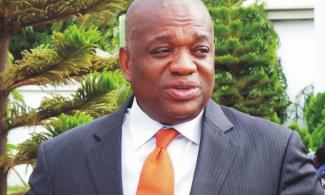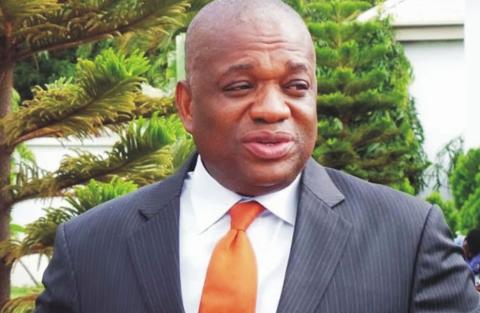
The claim by the former governor against his former deputy came to the fore during cross examination of EFCC investigator on Thursday at the Federal High Court In Ikoyi, Lagos.
Mr. Kalu’s lawyer, Awa Kalu (SAN), had asked the investigator if he knew that the petition upon which EFCC acted on was fueled by “bad blood”.

A former governor of Abia State, Orji Uzor Kalu, has accused Senator Enyinnaya Abaribe, lawmaker representing Abia South, of instigating the petition that led to his ongoing trial over alleged N3.2 billion fraud by the Economic and Financial Crimes Commission, EFCC.
The former governor said Abaribe who is now a senator instigated the petition because he was angry over his impeachment as Abia State Deputy Governor.
Abaribe was in 2003 impeached as the deputy governor to Kalu over allegations of gross misconduct.
The claim by the former governor against his former deputy came to the fore during cross examination of EFCC investigator on Thursday at the Federal High Court In Ikoyi, Lagos.
Mr. Kalu’s lawyer, Awa Kalu (SAN), had asked the investigator if he knew that the petition upon which EFCC acted on was fueled by “bad blood”.
The investigator, who had also testified against the former governor in the ongoing trial, confirmed that the petition was signed by Senator Abaribe.
He also confirmed that the petition was authored by Abia Leaders Forum who raised allegations of money laundering and stealing against Kalu.
"You must be aware that the process of impeachment led to bad blood between the signatory and the first defendant," the lawyer asked.
"We were not aware he was impeached; so, we didn't take that into consideration. We looked at the issues before us and we followed it professionally," the investigator answered.
"I suggest to you that that bad blood led to Exhibit G (the petition)," the SAN said.
"My Lord, like I said earlier, in our practice at the EFCC, we look at issues in a petition without emotions or personal feelings towards persons that are involved," Chukwuka responded.
When the SAN suggested to him that Abaribe signed the petition because he had scores to settle with Kalu, the investigator said, "As an investigator, experience has shown that the best result you can get is from the enemy."
In an attempt to disqualify EFCC’s earlier claim that Mr. Kale bought a house in the United States with proceeds of unlawful activities, the senior lawyer asked Mr. Chukwuka if he was aware that former President Olusegun Obasanjo also went after the said house.
Responding, he said EFCC said was not aware that former President Obasanjo wrote ex-American President, George Bush, over the $1.7m Potomac house which the former governor purchased in 2003.
Mr. Chukwuka, while being cross examined further said the alleged letter between Obasanjo and Bush was none of the anti-graft agency's business.
Chukwuka equally denied knowledge of the existence of any similar correspondence between Obasanjo and then Prime Minister of the United Kingdom, Tony Blair.
"I suggest to you that it was not only the EFCC that was interested in the property in Exhibit W1. I said so because then President Olusegun Obasanjo had correspondence with then US President, George W. Bush," Kalu confronted Chukwuka.
Responding, the investigator said, "My office is in the EFCC, not in the US."
"You may not also be aware that Obasanjo was in correspondence with then UK Prime Minister, Tony Blair, with respect to some properties," Kalu suggested to the witness.
"Not to my knowledge," he replied.
Asked by the SAN whether the EFCC discovered in the course of its investigations that the former governor acquired a "family house" in Boston, Massachusetts, "as far back as 1997", Chukwuka said he did not investigate the property.
"We are aware that the first defendant, by Nigerian standard, it is possible he has a house in the US, but the house in the US was not subject to investigation; so, we did not pay attention to that," he added.
"Did you find out that the area where that family house was located had racial issue on account of which he put it up for sale?" the lawyer asked the investigator.
"It was not part of our investigation," he said.
The lawyer further suggested to the investigator that "as a result of the racial issue, the first defendant sold the property for $3.8m in 2003," to which, Chukwuka again replied that "it was not part of our investigation, sir."
"Did your investigation show that the Potomac house was acquired with proceeds from the sale of the Boston property?" Kalu asked the investigator.
"We found an account where $1.7m was drawn and paid from a Nigerian bank," the investigator said.
"Did you uncover an account from Nigeria or any part of Africa where $1.7m was drawn to pay for the property?" Kalu asked.
"It may interest you that the suspect was investigated that time and he had foreign accounts and funds were moved from Nigeria into those foreign accounts," the investigator said.
"I suggest to you that the property in Potomac was funded from an offshore account in the US," Kalu put to the investigator, who then responded, "You are right."
"Specifically, that fund was from Chase Manhattan Bank, now JPMorgan; that was where the house was paid for," Kalu said, to which Chukwuka replied, "Yes."
The witness, however, said he was not aware that the ex-governor is a "legal permanent resident" in the US who holds a green card.
The witness said he was aware that Kalu filled and submitted assets declaration forms in 1999 and 2003.
"Did the asset declaration forms of 1999 and 2003 show the first defendant to be a pauper, a person who has no means or worthless?" Kalu asked the investigator.
"I may not be able to express opinion on that," the investigator replied.
Justice Mohammed Idris adjourned further proceedings till Friday.